'I want to shout my dad's story from the rooftops': From Benghazi to Burnley with the Libyan Cleaver who helped bring down Gaddafi
This article contains affiliate links. We may earn a small commission on items purchased through this article, but that does not affect our editorial judgement.
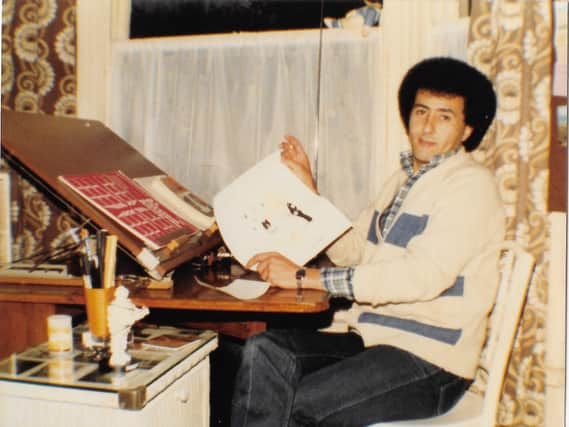

Hasan loved music, revelling in the atmosphere at reggae festivals, funk discos, and psychedelic parties in the '70s. Hasan loved painting, having been enthralled by art ever since he'd watched his father, Sheikh Mahmoud Dhaimish, draw pigeons on the tiles of their home in Libya as a young boy. Hasan lived in Burnley with his wife and three children.
But Hasan was also Alsatoor ('The Cleaver' in Arabic), the anonymous political cartoonist who encapsulated an international movement against the Libyan dictator Muammar Gaddafi with his art and satire, earning him a hushed reputation across the world as one of most outspoken, brash, and acerbic critics of the Gaddafi regime.
Advertisement
Hide AdAdvertisement
Hide AdHaving been born of Hasan's powerful sense of justice and his passion for art, Alsatoor arguably changed the world.
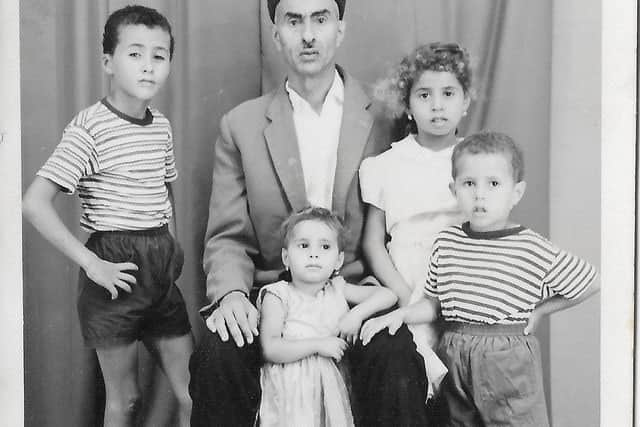

Born in Benghazi in 1955, Hasan grew up taping the latest funk and soul records onto his reel-to-reel from shortwave radio stations and, from an early age, cultivated a profound sense of curiosity for the wider world. At the age of 19, he arrived in London clad in flares, denim, and tailored shirts and boasting an afro. It was 1975 and he wanted to see things for himself.
Harbouring no intention to settle in the UK - like many Libyans in the '70s, he was confident Gaddafi would soon be deposed - he nevertheless soon developed a taste for life in Britain, where cultural change was gripping a nation enthralled by disco yet crippled by strikes, inflation, and unemployment.
Pursued by an inquisitive Home Office, Hasan eventually settled in Burnley and met Karen Waddington. The couple married in 1979 and had three children - Hannah, Sherif, and Zahra. His journey from Benghazi to Burnley was complete.
Advertisement
Hide AdAdvertisement
Hide AdWhen asked what about Britain made his father fall in love with the place, Hasan's son Sherif Dhaimish sighs. "It's such a shame that he's not here to answer that himself," he says. "I'm cautious of romanticising certain elements of my dad's story, but - at the time - a lot of Libyans were coming to the UK and going to the US for political reasons, whereas he didn't.
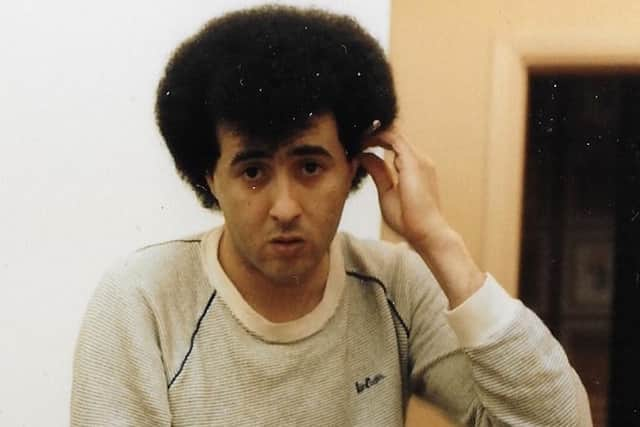

"He came out of curiosity," Sherif, 32, adds. "One of his biggest passions in life was music and he knew England was a place where music was happening. He was always a bit of a black sheep, too, which is probably why he ended up in Burnley as opposed to somewhere like Manchester. He loved the countryside and made friends quickly."
During a trip to London in '79, Hasan passed an Arabic newsstand outside Earl’s Court tube station and a magazine published by the Libyan Opposition caught his eye. He wrote to them, asking if he could contribute political cartoons. Working to the music of Miles Davis, Thelonious Monk, Dexter Gordon, Blind Wille Johnson, and Skip James, Alsatoor was born.
Bringing jazz and the blues to life through his art and absorbing the influences of British satire such as Private Eye, Giles, and The Viz, Alsatoor soon developed a unique satirical style - 'rhythmically witty, acerbically insightful, and playfully relentless', in Sherif's words. His reputation grew and any return to Libya became untenable. Hasan never saw his parents ever again.
Advertisement
Hide AdAdvertisement
Hide Ad"He liked that he could be anonymous in Burnley rather than part of a larger Libyan community," explains Sherif. "When he met my mum, a Burnley girl born-and-bred, he liked that they had control of his involvement in the diaspora because the late '70s was a time when you had to be very cautious about who you spoke to.
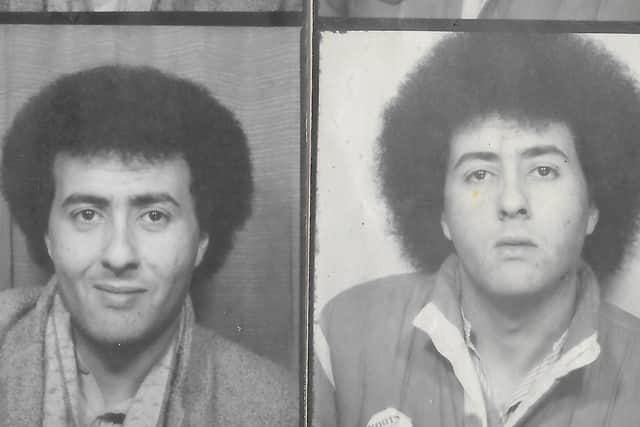

"A lot of people worked as spies or informants for the Libyan government and, had someone caught wind of who my dad was, that would have been bad," he adds. "I'm not saying he would've been assassinated, but that kind of thing did happen. He was a social chameleon who was able to blend in even though, at the same time, he never did fully blend in, you know?"
In the '90s, Hasan studied for A-levels and a degree whilst waiting tables at Carlo’s, eventually landing a teaching job in the graphics department at Nelson and Colne College in 1995. After work, he would glue himself to his desk watching Arabic-language news picked up from an array of sketchy satellite dishes, reaching new audiences via a burgeoning online community.
"He was divisive but he saw the necessity of that role, which I always admired," says Sherif. "Not everyone agreed with what he said and he was quick to criticise, so he upset people. He was ruthless and didn't care about backlash. In fact, he probably got a kick out of any backlash because he knew nobody else had the balls to stand up to the authorities."
Advertisement
Hide AdAdvertisement
Hide AdBut the work could be frustrating. Finding it difficult to maintain hope and fervour for political change in Libya, particularly after the disarmament in 2003, Hasan nevertheless felt a duty to the work he did and was spurred on in spite of the bleak reality. Some 36 years after leaving Libya, however, it all suddenly felt worthwhile.
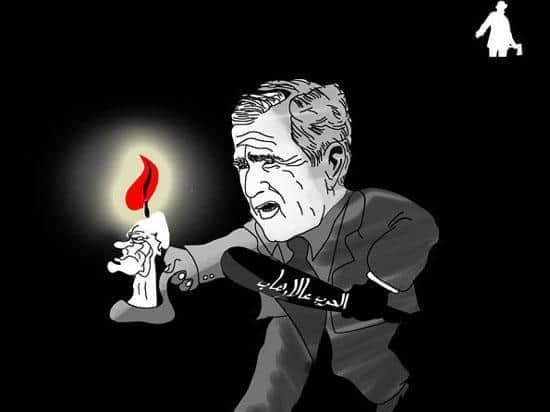

During the 2011 Libyan Revolution, Alsatoor worked interminably, promoting education and creativity amongst the country's incensed youth. "He didn't have a political agenda, he wanted the best for Libya," says Sherif. "Even when Gaddafi was killed, he was like 'okay, on to the next one; right, this is the problem with you and you're in charge now, so I'll criticise you'.
"It all came from wanting to expose corruption and call people out, which bigger outlets wouldn't do," he adds, with Hasan having moved to Qatar in 2011 to cover the revolution for Libyan TV, returning to England in 2014 before moving out to Jordan for a year in 2015. "In the last few years, he did become frustrated but he'd always get pulled back into the work.
"He saw Libyan politics as like banging your head against a wall, but he saw his part in it as a necessity, not something he could switch on and off," Sherif continues. "He stuck to his guns and made enemies along the way, but he opened people's eyes, too."
Advertisement
Hide AdAdvertisement
Hide AdThroughout his life, Hasan always held a deep love for the Lancastrian countryside, from which he drew profound inspiration for more personal artwork. And, while his work as Alsatoor may have drained him, his sense of duty never wavered. Right up until his death in 2016, Hasan's fundamental desire to disconnect and paint the rolling hills of his adopted home was never stronger than his zeal for a free Libya.
To tell their father's amazing story, Sherif and Hannah have curated a new exhibition of his work titled 'Resistance, Rebellion & Revolution: A Libyan Artist in Exile'. Set to take place at Hoxton 253 in London this August, the exhibition will coincide with the 10-year anniversary of the Libyan Revolution and will feature some 5,000 pieces of Alsatoor's satire.
"It's been a bonkers experience," says Sherif. "I've been working on refining my dad's story and finding ways of telling it to a wider audience because, first and foremost, his work is political, so my aim is to tell the story in broader terms than that. We're a country of all different colours and creeds and I think my dad's story really brings that home.
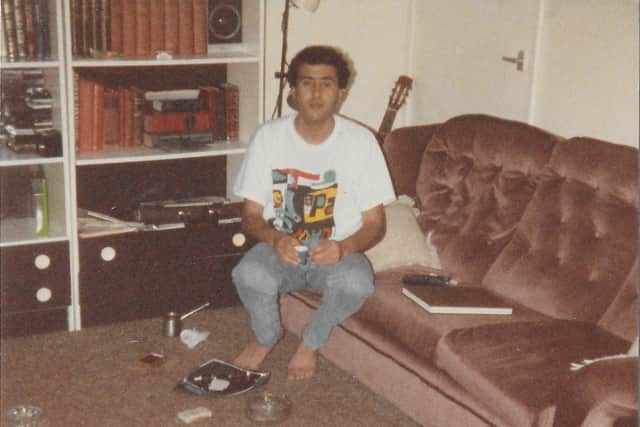

"The 10-year anniversary of the Libyan Revolution is a significant milestone," adds Sherif. "It's a time of reflection because the last 10 years have been exhausting; people have been divided. I want to build this project to have longevity because people understand the concept of a struggle against a higher power.
Advertisement
Hide AdAdvertisement
Hide Ad"As time goes on, the more potential I see for expanding and even going international. Maybe even into Libya as well - that would be the ultimate."
Unique and moving, the exhibition will see Alsatoor's work showcased in London for the first time through a series of canvases, prints and a hypnagogic avant-garde video, all of it shaped by Hasan's own musical tastes. Supported by Pendle Press and Arts Council England, it will be followed by events in Leeds, Manchester, Pendle, and Glasgow.
"I'm biased - I want to shout my dad's story from the rooftops because I'm proud," says Sherif. "My dad would probably tell me to chill out, but someone's got to tell it. My focus has always been telling his story the right way and I'm having fun finding ways to do that, especially when it brings people through the door who learn something new. That makes it worthwhile.
"I want people to come away with a keener appreciation of the human struggle," he adds. "My dad moved away from his homeland and, from exile, his difficulties resulted in fascinating expression. He was never able to go home, had to settle in a new society, suffered from depression for quite a long time, and conversed with his own children in his second language.
Advertisement
Hide AdAdvertisement
Hide Ad"To me, that's incomprehensible, and I can see my dad's struggle expressed in his artwork and satire," continues Sherif, who is also releasing a limited-edition book titled 'A Libyan Artist in Exile: Hasan ‘Alsatoor’ Dhaimish (1955-2016)' in addition to the exhibition. "My dad's story is one of humanity, struggle, and fighting against a higher power for human rights.
"That's not just a story familiar to Libya, it's innately human."
Comment Guidelines
National World encourages reader discussion on our stories. User feedback, insights and back-and-forth exchanges add a rich layer of context to reporting. Please review our Community Guidelines before commenting.